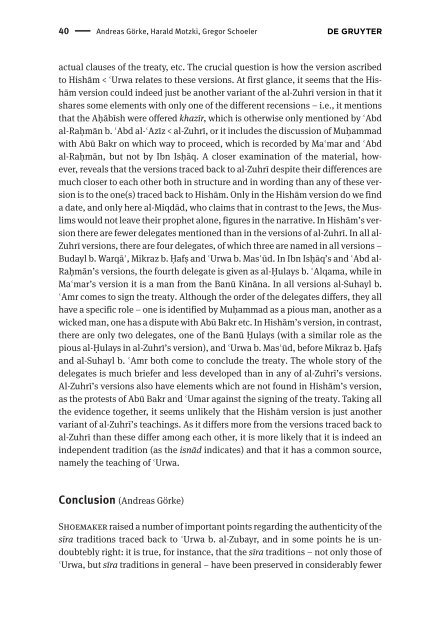0021-1818_islam_98-1-2-i-259
0021-1818_islam_98-1-2-i-259
0021-1818_islam_98-1-2-i-259
Create successful ePaper yourself
Turn your PDF publications into a flip-book with our unique Google optimized e-Paper software.
40 Andreas Görke, Harald Motzki, Gregor Schoeler<br />
actual clauses of the treaty, etc. The crucial question is how the version ascribed<br />
to Hisham < ^Urwa relates to these versions. At first glance, it seems that the Hisham<br />
version could indeed just be another variant of the al-Zuhr\ version in that it<br />
shares some elements with only one of the different recensions – i.e., it mentions<br />
that the A1ab\sh were offered khazir, which is otherwise only mentioned by ^Abd<br />
al-Ra1man b. ^Abd al-^Az\z < al-Zuhr\, or it includes the discussion of Mu1ammad<br />
with Abu Bakr on which way to proceed, which is recorded by Ma^mar and ^Abd<br />
al-Ra1man, but not by Ibn Is1aq. A closer examination of the material, however,<br />
reveals that the versions traced back to al-Zuhr\ despite their differences are<br />
much closer to each other both in structure and in wording than any of these version<br />
is to the one(s) traced back to Hisham. Only in the Hisham version do we find<br />
a date, and only here al-Miqdad, who claims that in contrast to the Jews, the Muslims<br />
would not leave their prophet alone, figures in the narrative. In Hisham’s version<br />
there are fewer delegates mentioned than in the versions of al-Zuhr\. In all al-<br />
Zuhr\ versions, there are four delegates, of which three are named in all versions –<br />
Budayl b. Warqa#, Mikraz b. 0afs and ^Urwa b. Mas^ud. In Ibn Is1aq’s and ^Abd al-<br />
Ra1man’s versions, the fourth delegate is given as al-0ulays b. ^Alqama, while in<br />
Ma^mar’s version it is a man from the Banu Kinana. In all versions al-Suhayl b.<br />
^Amr comes to sign the treaty. Although the order of the delegates differs, they all<br />
have a specific role – one is identified by Mu1ammad as a pious man, another as a<br />
wicked man, one has a dispute with Abu Bakr etc. In Hisham’s version, in contrast,<br />
there are only two delegates, one of the Banu 0ulays (with a similar role as the<br />
pious al-0ulays in al-Zuhr\’s version), and ^Urwa b. Mas^ud, before Mikraz b. 0afs<br />
and al-Suhayl b. ^Amr both come to conclude the treaty. The whole story of the<br />
delegates is much briefer and less developed than in any of al-Zuhr\’s versions.<br />
Al-Zuhr\’s versions also have elements which are not found in Hisham’s version,<br />
as the protests of Abu Bakr and ^Umar against the signing of the treaty. Taking all<br />
the evidence together, it seems unlikely that the Hisham version is just another<br />
variant of al-Zuhr\’s teachings. As it differs more from the versions traced back to<br />
al-Zuhr\ than these differ among each other, it is more likely that it is indeed an<br />
independent tradition (as the isnad indicates) and that it has a common source,<br />
namely the teaching of ^Urwa.<br />
Conclusion (Andreas Görke)<br />
Shoemaker raised a number of important points regarding the authenticity of the<br />
sira traditions traced back to ^Urwa b. al-Zubayr, and in some points he is undoubtebly<br />
right: it is true, for instance, that the sira traditions – not only those of<br />
^Urwa, but sira traditions in general – have been preserved in considerably fewer


